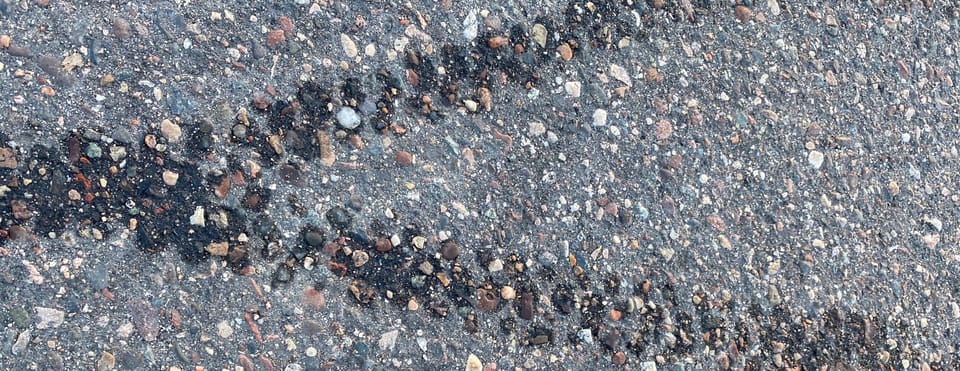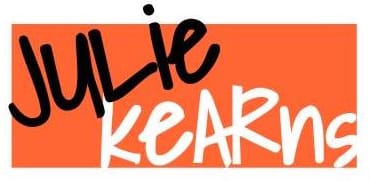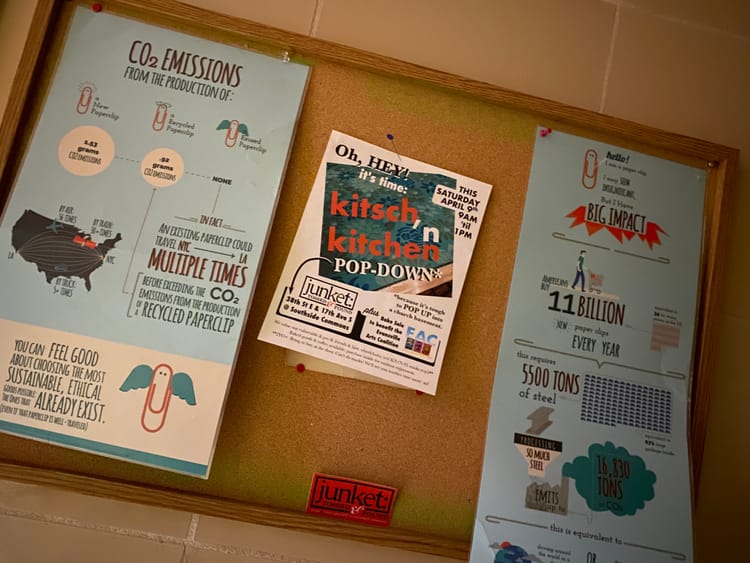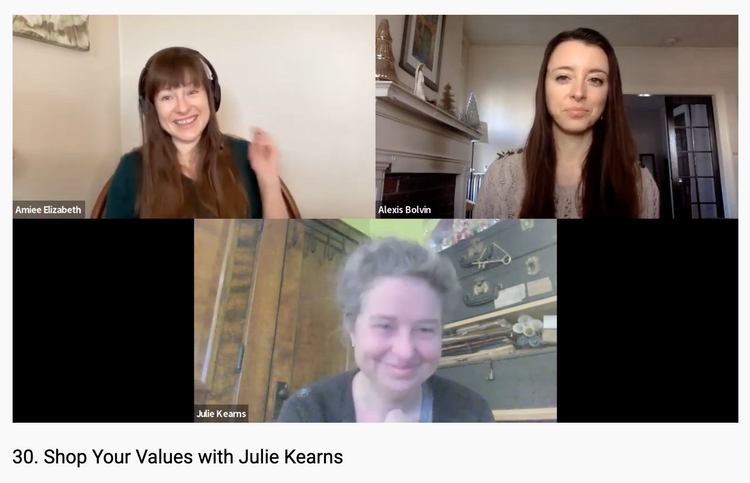Traction (who's got it, who needs it?)

Friends! It's been a bit. The last several weeks have been filled with a bit of a hybrid hustle: rescuing things from houses, setting up and testing spreadsheet-based listing systems/automation, and fulfilling holiday orders. The busy-ness has interfered some with the organizing of thoughts, the living room floor littered with partial projects (no room for the yoga mat), and I keep telling myself that today's the day I'll get that cleared up enough to restart the routine - again, again, again.
Sometimes, you need to be forced head-down in the chaos, compelled to focus on stuff you've been telling yourself must come after you get things tidy, organized, or better looking...
Today, I'm wondering if I really needed to land face-first on yesterday's pavement to be reminded that these self-told requirements are artificial barriers, but since that's where life's at (and, since 'better looking' is unlikely to be my lot - at least for the next several days as parts of my face bruise in different degrees and colors), I'm choosing to focus on bringing you up to speed on recent progress rather than risk another close encounter of an icy sidewalk - or even socks-on-hardwoods - sort.
While my physical body is paying for yesterday's total loss of traction, I am grateful that the work I've long known was mine to do finally has some grit underfoot.
In strictly 'business as usual' terms, COVID is a magnificent pain in the ass – but it does give us a framework for - and appreciation of - the nimble pivot required to navigate turbulence and uncertainty – and given Junket's years of experience with both, it's reassuring to see a clear path ahead – one wide and forgiving enough to permit the occasional dip, tuck and roll without risk of careening off of any edges.
Here's where we're at right now:
DONE: I've secured a physical home for Junket with easy walk, bike, and citywide transit access. The lease is signed. The building features values-aligned management and tenants, and enough physical space to host community events, develop rhythms, and strengthen shared skills, networks & relationships in the months and years ahead. Overhead is low, potential is high. Win/win/win (/win/win...)
BEGINNING: I've been pondering this site's subscription strategy, and wondering how best to engage given what I know about my brain and how it tends to work... Is erratic content delivery a dealbreaker, or could it be charming in a 'let this be easy' sort of way? I have so much respect for Seth Godin's daily practice, and yet the mere idea of that pacing and frequency exhausts me (and I imagine I might exhaust you, too).
BEGINNING: I've begun a spontaneous effort to link existing community networks and resources to divert estate contents from the waste streams into which they're currently designed to flow. To date, this effort includes conversations with humans engaged in: Longfellow's Buy Nothing network, Transition Towns (Longfellow/MN with National access), and intent to engage folks from Impact HUB MN, FinnLab, ReuseMN, & humans working in corporate networks as opportunities present. I'm excited about how common goals among loosely layered groups - in many of the same geographic areas - present rapid resilience-building opportunities.
BEGINNING: Discussions are underway to launch online trainings/classes to co-facilitate individual and social climate adaptation efforts. What do curricula look like? What about a test run? I have a 'Weight Watchers' styled conceptual model for socializing the highly personal work of reducing our material/environmental obesity that has held my attention for years now. I'd like to develop it.
BEGINNING: Conversations with Ridwell, a West Coast reuse/recycling company preparing to make Minneapolis their next 'bin subscription' market. I'm curious about something the founder mentioned about having the infrastructure to do product drop-offs at member houses during a lunch and learn this week. What's it worth to have doorstep access to the most sustainable products possible? Whether or not conversations turn into anything concrete, it's an exciting prospect, and I encourage you to sign up for Ridwell's Minneapolis pre-launch list (they've hit the 2000 emails sign-up target, so it's gonna happen!): https://www.ridwell.com/join/twin-cities
CONTINUING: Recorded conversations with Julia Curran. These are podcast-in-development content, with a focus on systems thinking, climate adaptation, the thrill of positive social change, habits and interests that are good for planet AND psyche. If anyone has the talent and/or desire to help us edit/goat-herd/produce audience-ready content, we (two ADHD brained humans) would be so grateful! I'd love to have these ready to roll as online trainings come together...
CONTINUING: While online sales are enough to support my household proper, I haven't quite bridged Junket's financial gap - money I willingly paid, into the red, to keep people employed as we lost the lease and moved through an extended transition and into another, then another, slouching toward Bethlehem, pivot, pivot, pivot. I'm pursuing options and motivated to put historic debt to bed so I can ramp up the time and attention I'm spending on systems and infrastructure development.
CONTINUING: There's value - beyond the dollars - in getting to fulfill Junket's online product orders at a tactical level. Creatively problem-solving to deliver a climate-competent experience within existing commerce systems keeps me engaged: What's scalable? What's a hassle? What's valued/appreciated/misunderstood? Every order gets a thank you note written in walnut ink distilled by me from hand-foraged husks... for every thank you note I resented writing in my younger years, I've gladly written more to strangers in 2021.
You may also be surprised to learn that I'm not selling paper clips, considering how many years I've been talking about them. Lessons gleaned from my years of brick & mortar rubik's-cubing on how to deliver such a banal commodity resale product at mass retail scale have been useful as I continue to sell, package, and ship other small items (that was always the goal: solve for those clips to glean lessons for everything else).
A growing segment of our target market - mostly shoppers in trend-forward coastal cities - are okay paying $8 to ground-ship a single sewing needle or pair of new old stock shoelaces.
While margins are strong, personal capacity is limited, so marketing is currently next to nil. I know how to create excitement and drive traffic – yet I hesitate to build something I'd need to bend over backwards to maintain without first having a plan to involve others in execution. Involving others in this aspect of the model is on the radar. Co-op? Maybe.
Customer feedback on our 100% reuse packaging strategies, meanwhile, continues to be powerfully positive (want!):
"I love that this shop repurposes old papers for shipping materials. It made opening the package feel like a treasure hunt!"
"Oh my lawd I cannot say how happy I am... Feel good sustainable shipping materials too! Squee!!!!! Couldn't be happier!!!"
"My excitement while opening my package was felt by all those around me...."
"I didn’t know what I was in for but it turned out to be an extreme source of intrigue...The whole lot was utter madness and I enjoyed every moment of it."
Showing care in commerce is a powerful force for building trust and connection across state lines and geographic boundaries. While what Junket offers as product is often easy enough to scavenge for free in cities (at least in non-pandemic times), these things can be harder to come by in rural and remote settings. Recent interactions with a small town Alaska buyer have reminded me of the powerful value proposition of an ethical and emissions-limited commodity product alternative to companies like Am-anon.
I also find the work of thoughtfully repairing some of these distant connections themselves to be regenerative and well aligned with the spirit of our model: establishing trust after inadvertently triggering disappointment or learning of third party shipping delays, for example, has parallels in the broader dialectics of turning garbage into salable inventory, culling beauty out of brokenness: our systems aren't designed to reward generosity of spirit or well-exceeded expectations (but they could be).
UP NEXT: On the other hand, some things - and relationships - prove themselves unworthy of investment. It makes sense to leverage Omicron's recent, rapid spread as rationale for another pivot away from in-person (yes, just as we've gotten that started again) toward lower-impact local delivery models, and away from Mailchimp (yes, just as we've gotten that started again) toward this site (where I aim to do most work/communicating going forward).
After fielding a trollish reply to one of our most recent outreach messages (lady, you signed up for the list!), I'm working to release my attachment to an old email list with six thousand contacts, many of whom likely signed up to learn about shop sales and in hopes of winning freebies. I imagine that shedding a good chunk of the list isn't that much of a loss, but it still feels like I'm preparing to jump out of a plane.
SO. That's where we're at today. A little bit vulnerable, a lot bit excited, and fair to middling on traction, depending on how I define it. Also, my face hurts, and I'd rather not make that worse, so I'm checking the proverbial parachute rigging, and surveying the terrain: where, when, and how best to leap for max traction? Outside perspectives welcomed.
I don't have subscriptions set up here yet (soon enough, on an opt-in basis, with specific foci given my inability to Pick Just One), but the coffee fund is quietly open over at ko-fi.com/juliejunket, and if you value this work, I'd welcome a tip in that jar for the time being.
More to come, and soon,
Julie



Member discussion